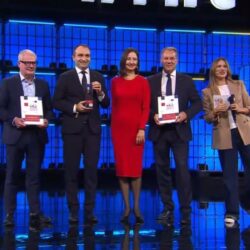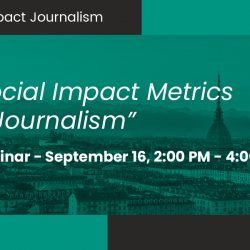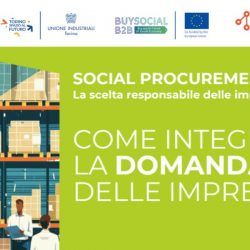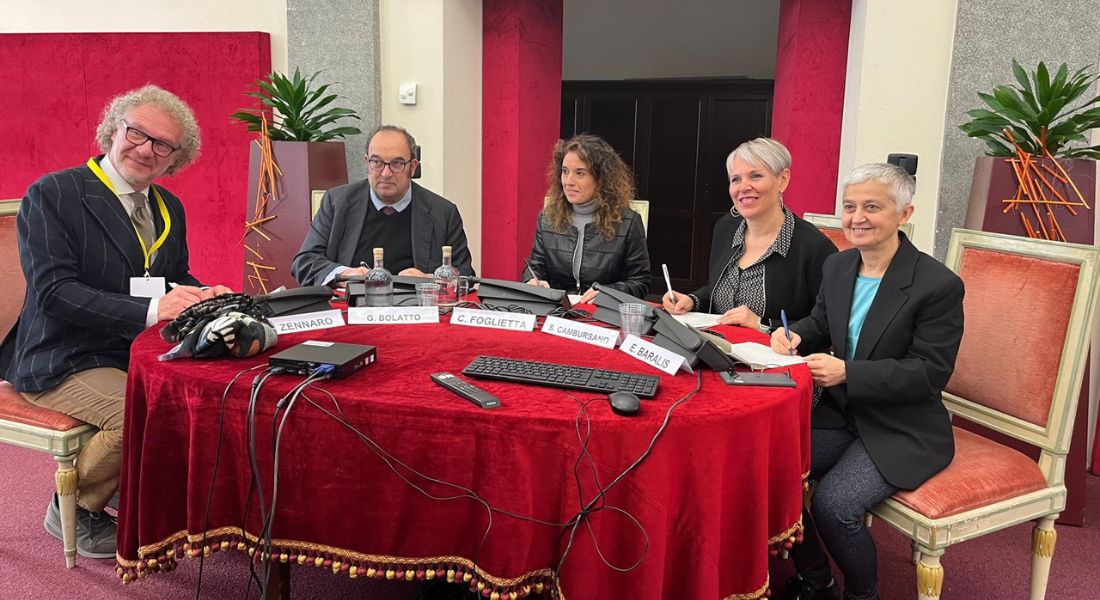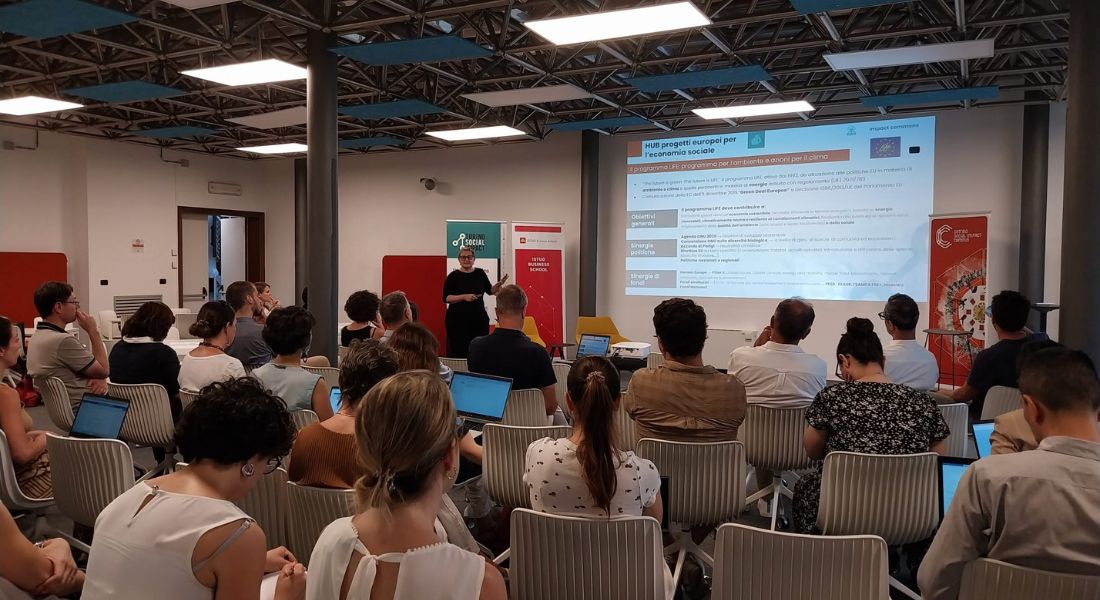In the first year of experimentation, 4 projects won in the region.
Social economy is a tool to attract resources aimed at providing innovative solutions for the benefit of the community.
The Turin Chamber of Commerce, City of Turin, Metropolitan City of Turin, University of Turin, and Polytechnic University of Turin signed a Memorandum of Understanding on November 15th to collaborate on the European Projects Hub for Social Economy as part of Torino Social Impact. The signing took place two days after the European Commission gave significant recognition to the City of Turin as a pioneering city in providing innovative solutions for its citizens. Social economy is now widely acknowledged as one of the most valid and effective tools.
In line with the goals of Torino Social Impact, the idea of a European Projects Hub for Social Economy was born in 2023, initiated thanks to the contribution of the Turin Chamber of Commerce and the Compagnia di San Paolo Foundation, in co-design with Weco Impresa Sociale, a TSI partner committed to promoting approaches and methods for social transformation alongside institutions, businesses, and non-profit organizations. The Hub aims to enhance the ecosystem’s skills in European project design to seize the many financial opportunities offered by the European Union on social impact at the community level.
Given the initiative’s usefulness and importance in the current European context, and in the spirit of synergy and collaboration characterizing the entities in the region, a shared commitment has been formalized to enhance and develop it further, aligning objectives to attract European investments for social economy in the Turin area, with a focus on capacity building for Torino Social Impact partners and active participation in funding calls.
Guido Bolatto, Secretary General of the Turin Chamber of Commerce, stated: “The European Projects Hub for Social Economy envisions the creation of a Steering Committee involving all signatory entities, with the goal of planning activities, proposing initiatives, and monitoring results. We are convinced that this synergy will only multiply the potential already demonstrated during the first year of experimentation carried out within Torino Social Impact. Creating a system among institutions to enhance the ability to attract funds for the social economy is strategic to supporting the region in jointly pursuing social and environmental sustainability goals.”
Chiara Foglietta, Councillor for Innovation of the City of Turin, remarked: “The European Projects Hub for Social Economy represents an extraordinary opportunity for the Turin region, not only as a local reference point but also from a broader growth perspective. Networking is essential to enhance skills, share resources, and capitalize on good practices that can have an impact on a European scale. Turin, with its rich ecosystem of institutions, businesses, and the third sector, is the ideal place to launch such innovative initiatives. Through a capacity-building approach, the Hub aims to leverage numerous EU financial opportunities, fostering the growth of the social economy. This is an opportunity to seize for our city: thanks to the synergy among Torino Social Impact partners, conditions can be created to attract investments, stimulate social entrepreneurship, and make a further active contribution to a more inclusive and sustainable Europe.”
Sonia Cambursano, Councillor for Economic Development of the Metropolitan City of Turin, stated: “The Metropolitan City of Turin enthusiastically joins the European Projects Hub for Social Economy within the framework of Torino Social Impact. Attracting investments and entrepreneurial ideas to solve social problems is a mission we fully share and work towards through the implementation of the Metropolitan Strategic Plan, as social innovation practices align perfectly with the axes of ‘Digitization, Innovation, Competitiveness, and Culture’ and ‘Social Inclusion.’ We are already investing in the InnoSocialMetro program to increase the ability of micro and small enterprises in the region to generate socially desirable impacts through their for-profit activities. We have allocated financial support consisting of interest-free contributions and grants, for a total investment of €1.3 million.”
Alessandro Zennaro, Vice-Rector of the University of Turin for the enhancement of human and cultural capital, said: “Transferring our skills to the region to promote economic and social growth is an integral part of the University’s mission. Networking is essential to amplify the impact of projects and initiatives in the region, particularly in a field like social economy, where responding to emerging social challenges requires collaboration between various public and private entities and the active involvement of the third sector. Therefore, as universities, we are particularly proud to contribute the wealth of knowledge and experience gained at our university to the new Hub to help identify new socially and environmentally sustainable economic models capable of attracting European funding.”
Elena Maria Baralis, Pro-Rector of the Polytechnic University of Turin, added: “The Polytechnic University of Turin has always supported Turin Social Impact and is ready to provide all its know-how to maximize the opportunities offered by European funding in the field of social entrepreneurship, in line with the objectives identified in this rectoral mandate.”
A context of European and international policy to support the social economy
In 2023, the EU Council approved the Recommendation on Developing Social Economy Framework Conditions, highlighting the social economy as a strategic sector for achieving a socially and environmentally sustainable Europe. This builds on prior EU documents, notably the Social Economy Action Plan (2021) and the inclusion of proximity and social economy ecosystems among the 14 industrial ecosystems for European economic recovery. Among the recommendations that EU member states must incorporate into national policies and legislation, the importance of territorial systems and their ability to serve as hubs for financial opportunities stands out. The document suggests establishing national, local, or regional contact points for social economy to act as ambassadors for the sector, promote it, facilitate peer support, and enable access to EU and national funding while acting as intermediaries with managing authorities.
Similarly, at the United Nations level, social economy has gained prominence as a tool for achieving the SDGs, with the approval of the 2023 UN General Assembly Resolution “Promoting the Social and Solidarity Economy for Sustainable Development”.
The activities of the HUB
The Hub operates through a Hub & Spoke system, involving expert entities, European project designers, and enabling local organizations to facilitate ecosystem participation in EU funding calls.
The project includes workshops and info sessions on European Commission programs, capacity-building and peer-learning processes, connecting TSI partners to share experiences and stimulate idea generation and project design.
These activities are co-designed with Weco Impresa Sociale, a partner of Torino Social Impact engaged in promoting social transformation approaches and methods alongside institutions, businesses, and non-profits.
In 2023, supported by the Chamber of Commerce and the Compagnia di San Paolo, the initial activities of the European Projects Hub for Social Economy included mapping partner interests with 40 responses, organizing three sessions with 20 idea-generation tables, providing 45 hours of guidance, involving 22 experts and over 50 partners, and supporting 12 entities in submitting Erasmus+ proposals. In 2024, the Hub achieved the submission of 11 European projects, including 7 Erasmus+, hosting workshops and mentoring sessions with numerous partners and experts. Four projects were successfully funded, including one by the social cooperative Progetto Tenda, which presented its experience supporting an Erasmus+ project focused on linguistic inclusion to improve the employability of adult migrants.
Popular
